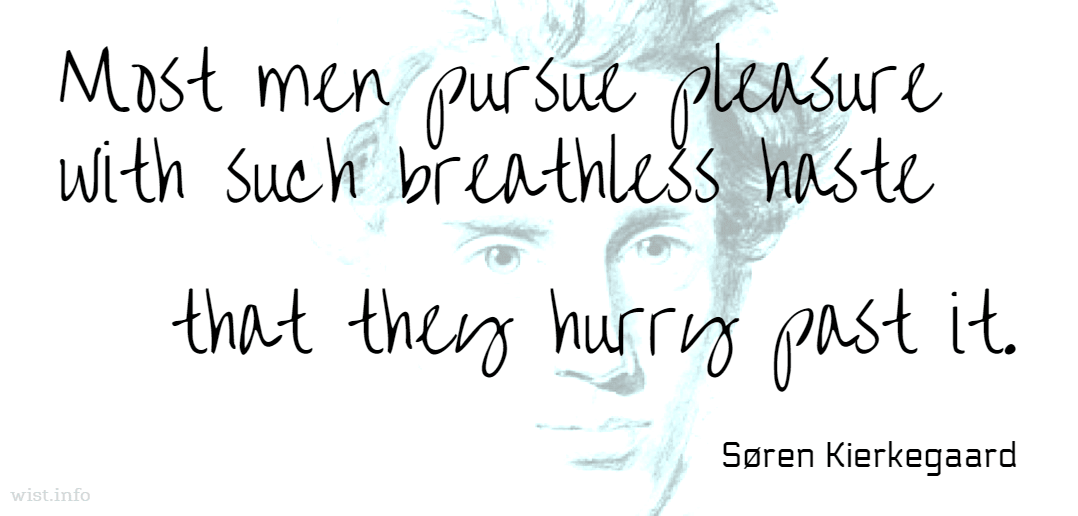I flee you, Dindymus, when chased; I chase you when you flee.
It’s not your wanting me I want; it’s your not wanting me.
[Insequeris, fugio; fugis, insequor; haec mihi mens est:
Velle tuum nolo, Dindyme, nolle volo.]Martial (AD c.39-c.103) Spanish Roman poet, satirist, epigrammatist [Marcus Valerius Martialis]
Epigrams [Epigrammata], Book 5, epigram 83 (5.83) (AD 90) [tr. McLean (2014)]
(Source)
"To Dindymus." (Source (Latin)). Alternate translations:
I fly, you follow; fly when I pursue:
What I love, hate; what hated, loved by you.
[tr. Wright (1663)]
You pursue, I fly; you fly, I pursue; such is my Humour. What you wish, Dindymus, I do not wish; what you do not wish, I do.
[tr. Bohn's Classical (1859)]
You pursue me, I fly; you fly, I follow. Such is your mind; your willingness I reject, Dindymus, your coyness I prize.
[tr. Ker (1919)]
Follow, and I shall flee,
Fly, I shall follow thee;
Such is the bent
Of love’s perversity;
Denial draweth me,
But not assent.
[tr. Pott & Wright (1921), "The Old Story"]
You follow, I flee; you flee, I follow.
That's the way it goes.
I hate your yesses, Dindymus,
I much prefer your noes.
[tr. Marcellino (1968)]
I run, you chase; you chase, I run.
I love what's cold: what's hot I shun.
[tr. Whigham (1987)]
You're hot to trot? Well then I'm not.
You've cooled? I'm ardent on the spot.
What's going on? Don't sulk, my pet:
I like you best as hard to get.
[tr. Matthews (1992)]
You pursue, I fly; you fly, I pursue. This is the way I am. Your wishing, Dindymus, I wish not; your wishing not I wish.
[tr. Shackleton Bailey (1993)]
You chase, I flee; you flee, I chase; it’s how I am:
what you wish I don’t, Dindymus, what you don’t I wish.
[tr. Kline (2006), "Contrary"]
I fly when you pursue me,
But when you shy, I woo thee.
Explain it to me, can't you,
Why I must ever want to want you.
[tr. Wills (2007)]
Quotations about:
pursuit
Note not all quotations have been tagged, so Search may find additional quotes on this topic.
This life is a hospital in which every patient is haunted by the desire to change beds. This one wants to suffer in front of the stove, and that one believes he will recover next to the window.
[Cette vie est un hôpital où chaque malade est possédé du désir de changer de lit. Celui-ci voudrait souffrir en face du poêle, et celui-là croit qu’il guérirait à côté de la fenêtre.]Charles Baudelaire (1821-1867) French poet, essayist, art critic
Le Spleen de Paris (Petits Poèmes en Prose), No. 48 “Any Where Out of the world” (1869) [tr. Kaplan (1989)]
(Source)
The title of the original is in English, a line from Thomas Hood, "The Bridge of Sighs." It is often subtitled with the French translation, "N’importe où hors du monde," which are the final lines.
(Source (French)). Alternate translations:
Life is a hospital, in which every patient is possessed by the desire of changing his bed. One would prefer to suffer near the fire, and another is certain that he would get well if he were by the window.
[tr. Symons (<1919)]
This life is a hospital where every patient is possessed with the desire to change beds; one man would like to suffer in front of the stove, and another believes that he would recover his health beside the window.
[tr. Hamburger (1946)]
Life is a hospital where every patient is obsessed by the desire of changing beds. One would like to suffer opposite the stove, another is sure he would get well beside the window.
[tr. Varèse (1970)]
This life is a hospital where each patient is possessed with the desire of changing his bed. One would like to suffer in front of the stove, and another believes he would get well beside the windows.
[tr. Fowlie (1992)]
This life is a hospital, where each patient is possessed by the desire to change beds. That one prefers to suffer nearer the stove and this one believes he would get well next to the window.
[tr. Waldrop (2009)]
Consider what you came from: you are Greeks!
You were not born to live like mindless brutes
but to follow paths of excellence and knowledge.[Considerate la vostra semenza:
fatti non foste a viver come bruti,
ma per seguir virtute e canoscenza.]Dante Alighieri (1265-1321) Italian poet
The Divine Comedy [Divina Commedia], Book 1 “Inferno,” Canto 26, l. 118ff (26.118-120) [Ulysses] (1309) [tr. Musa (1971)]
(Source)
Speaking to his sailors on their final voyage, urging them to explore the unknown.
(Source (Italian)). Alternate translations:
On your original reflect, nor think
That you were, made, like Brutes, to only live,
But knowledge and to virtuous acts pursue.
[tr. Rogers (1782)]
Recall your glorious toils, your lofty birth.
Nor like the grov'ling herds, ally'd to earth.
No base despondence quit your lofty claim.
[tr. Boyd (1802), st. 19]
Call to mind from whence we sprang:
Ye were not form’d to live the life of brutes
But virtue to pursue and knowledge high.
[tr. Cary (1814)]
Bethink you of your birth-rank and its dues:
Ye were not thus for brutish life endued.
But Virtue's path and Learning's born to chuse.
[tr. Dayman (1843)]
Consider your origin: ye were not formed to live like brutes, but to follow virtue and knowledge.
[tr. Carlyle (1849)]
Consider, then, the birth from whence you sprung:
You were not made, like brutes, to live and die:
The path of virtue and of knowledge try.
[tr. Bannerman (1850)]
Consider well the seed from whence you sprung;
You were not made to live as live the beasts,
But to seek virtue and true knowledge grasp.
[tr. Johnston (1867)]
Consider ye the seed from which ye sprang;
Ye were not made to live like unto brutes,
But for pursuit of virtue and of knowledge.
[tr. Longfellow (1867)]
Consider your begetting; ye were not made to live as brutes, but to follow virtue and knowledge.
[tr. Butler (1885)]
Over your noble birthright ye should muse;
To live like senseless brutes ye were not made,
But knowledge to pursue and virtue use.
[tr. Minchin (1885)]
Consider ye your origin; ye were not made to live as brutes, but for pursuit of virtue and of knowledge.
[tr. Norton (1892)]
Bethink you of your birth: ye were not made to live the life of brutes, but to obey the call of valour and of knowledge.
[tr. Sullivan (1893)]
Consider ye the seed that ye are sprung from:
Ye were not made to live as the brute creatures,
But that ye virtue might pursue and knowledge.
[tr. Griffith (1908)]
Take thought of the seed from which you spring. You were not born to live as brutes, but to follow virtue and knowledge.
[tr. Sinclair (1939)]
Think on the seed ye spring from! Ye were made
Not to live life of brute beasts of the field
But follow virtue and knowledge unafraid.
[tr. Binyon (1943)]
Think of your breed; for brutish ignorance
Your mettle was not made; you were made men.
To follow after knowledge and excellence.
[tr. Sayers (1949)]
Greeks! You were not born to live like brutes,
but to press on toward manhood and recognition!
[tr. Ciardi (1954), l. 110]
Consider your origin: you were not made to live as brutes, but to pursue virtue and knowledge.
[tr. Singleton (1970)]
Consider well the seed that gave you birth:
you were not made to live your lives as brutes,
but to be followers of worth and knowledge.
[tr. Mandelbaum (1980)]
Consider then the race from which you have sprung:
You were not made to live like animals,
But to pursue virtue and know the world.
[tr. Sisson (1981)]
Consider well your seed:
You were not born to live as a mere brute does,
But for the pursuit of knowledge and the good.
[tr. Pinsky (1994)]
Consider your sowing: you were not made to live like brutes, but to follow virtue and knowledge.
[tr. Durling (1996)]
Consider your origin: you were not made to live like brutes, but to follow virtue and knowledge.
[tr. Kline (2002)]
Hold clear in thought your seed and origin.
You were not made to live as mindless brutes,
but go in search of virtue and true knowledge.
[tr. Kirkpatrick (2006)]
Consider how your souls were sown:
you were not made to live like brutes or beasts,
but to pursue virtue and knowledge.
[tr. Hollander/Hollander (2007)]
Think of your origins, the people you come from:
You were not made to live like wild-toothed beasts,
But for the pursuit of virtue and honest knowledge.
[tr. Raffel (2010)]
Remember now your pedigree.
You were not born to live as brutes. Virtue
And knowledge are your guiding lights.
[tr. James (2013)]
There are two tragedies in life. One is not to get your heart’s desire. The other is to get it.
George Bernard Shaw (1856-1950) British playwright and critic
Man and Superman, Act 4 [Mendoza] (1903)
(Source)
See Wilde, eleven years earlier. More discussion quote: There Are Only Two Tragedies. One Is Not Getting What One Wants, and the Other Is Getting It – Quote Investigator.
In this world there are only two tragedies. One is not getting what one wants, and the other is getting it.
Oscar Wilde (1854-1900) Irish poet, wit, dramatist
Lady Windermere’s Fan, Act 3 [Dumby] (1892)
(Source)
More discussion of this quote: There Are Only Two Tragedies. One Is Not Getting What One Wants, and the Other Is Getting It – Quote Investigator.
If you believe you have a just cause, an important message, or a key contribution to make, you will be just as innovative as a college freshman desperate to see his girlfriend six hundred miles away. You will get there any way you can.
Laurie Beth Jones (b. 1952) American author, motivational speaker, leadership coach
Jesus, CEO, “He Was Willing to Do an End Run” (1995)
(Source)
Go we seek that we shall not find.
Thomas Malory (c. 1415-1471) English writer
Le Morte d’Arthur, Book 16, ch. 2 (1485)
(Source)
Ector to Lancelot (or vice versa) in Ector's dream. Often paraphrased/modernized to "We shall now seek that which we shall not find."
A man may hear a thousand lectures, and read a thousand volumes, and be at the end of the process very much where he was, as regards knowledge. Something more than merely admitting it in a negative way into the mind is necessary, if it is to remain there. It must not be passively received, but actually and actively entered into, embraced, mastered. The mind must go half-way to meet what comes to it from without.
John Henry Newman (1801-1890) English prelate, Catholic Cardinal, theologian
The Idea of a University, Lecture 9 “Discipline of Mind,” sec. 4 (1852)
(Source)
He exits, pursued by a bear.
William Shakespeare (1564-1616) English dramatist and poet
Winter’s Tale, Act 3, sc. 3, l. 64 (3.3.64) [Stage Direction] (1611)
(Source)
Variant: "Exit, pursued by a Bear."












